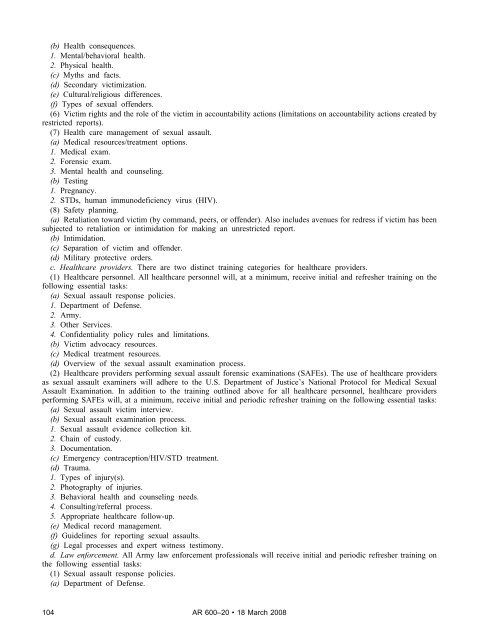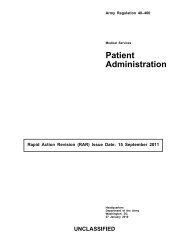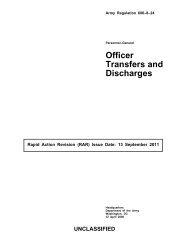AR 600-20, Army Command Policy - Army Publishing Directorate ...
AR 600-20, Army Command Policy - Army Publishing Directorate ...
AR 600-20, Army Command Policy - Army Publishing Directorate ...
Create successful ePaper yourself
Turn your PDF publications into a flip-book with our unique Google optimized e-Paper software.
(b) Health consequences.<br />
1. Mental/behavioral health.<br />
2. Physical health.<br />
(c) Myths and facts.<br />
(d) Secondary victimization.<br />
(e) Cultural/religious differences.<br />
(f) Types of sexual offenders.<br />
(6) Victim rights and the role of the victim in accountability actions (limitations on accountability actions created by<br />
restricted reports).<br />
(7) Health care management of sexual assault.<br />
(a) Medical resources/treatment options.<br />
1. Medical exam.<br />
2. Forensic exam.<br />
3. Mental health and counseling.<br />
(b) Testing<br />
1. Pregnancy.<br />
2. STDs, human immunodeficiency virus (HIV).<br />
(8) Safety planning.<br />
(a) Retaliation toward victim (by command, peers, or offender). Also includes avenues for redress if victim has been<br />
subjected to retaliation or intimidation for making an unrestricted report.<br />
(b) Intimidation.<br />
(c) Separation of victim and offender.<br />
(d) Military protective orders.<br />
c. Healthcare providers. There are two distinct training categories for healthcare providers.<br />
(1) Healthcare personnel. All healthcare personnel will, at a minimum, receive initial and refresher training on the<br />
following essential tasks:<br />
(a) Sexual assault response policies.<br />
1. Department of Defense.<br />
2. <strong>Army</strong>.<br />
3. Other Services.<br />
4. Confidentiality policy rules and limitations.<br />
(b) Victim advocacy resources.<br />
(c) Medical treatment resources.<br />
(d) Overview of the sexual assault examination process.<br />
(2) Healthcare providers performing sexual assault forensic examinations (SAFEs). The use of healthcare providers<br />
as sexual assault examiners will adhere to the U.S. Department of Justice’s National Protocol for Medical Sexual<br />
Assault Examination. In addition to the training outlined above for all healthcare personnel, healthcare providers<br />
performing SAFEs will, at a minimum, receive initial and periodic refresher training on the following essential tasks:<br />
(a) Sexual assault victim interview.<br />
(b) Sexual assault examination process.<br />
1. Sexual assault evidence collection kit.<br />
2. Chain of custody.<br />
3. Documentation.<br />
(c) Emergency contraception/HIV/STD treatment.<br />
(d) Trauma.<br />
1. Types of injury(s).<br />
2. Photography of injuries.<br />
3. Behavioral health and counseling needs.<br />
4. Consulting/referral process.<br />
5. Appropriate healthcare follow-up.<br />
(e) Medical record management.<br />
(f) Guidelines for reporting sexual assaults.<br />
(g) Legal processes and expert witness testimony.<br />
d. Law enforcement. All <strong>Army</strong> law enforcement professionals will receive initial and periodic refresher training on<br />
the following essential tasks:<br />
(1) Sexual assault response policies.<br />
(a) Department of Defense.<br />
104 <strong>AR</strong> <strong>600</strong>–<strong>20</strong> 18 March <strong>20</strong>08
















